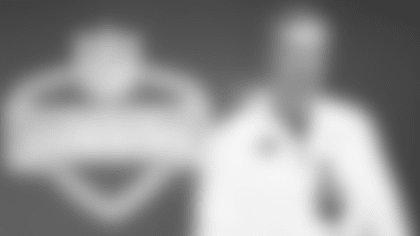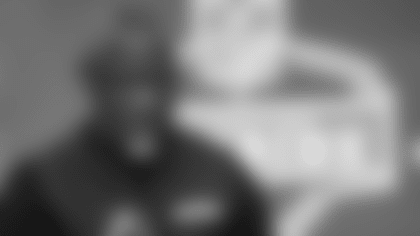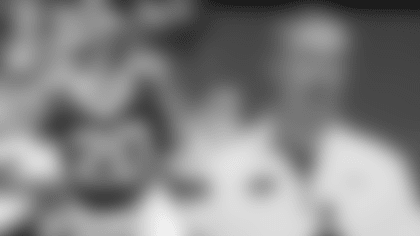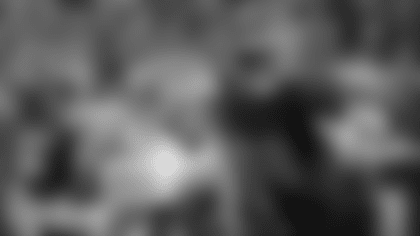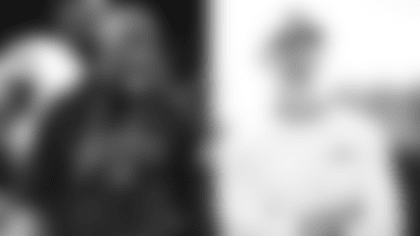Transcript of head coach Eric Mangini's news conference with the New York Jets media Thursday morning:
Yesterday we released Mike Elgin from the practice squad and we signed Jerry Mackey, linebacker. I just want to clarify one injury situation. Erik Coleman's injury has been changed from head injury to concussion, so that will be reflected today on the injury report.
Yesterday, working on the Giants, it was very important offensively to understand their multiple looks, their multiple pressure looks, the way they can bring pressure from different areas and how we need to fit and handle those pressures and understand where your help is in the protection and in the blocking scheme. That's always challenging, especially when you have the amount of talented rushers and the combinations of different rush patterns they have defensively, understanding how their routes are going to unfold, how they use their different personnel, how they create different formations to utilize that personnel. Again, that's challenging as well. So we got some good work done on that yesterday and we'll continue to work on that.
We introduced two-minute yesterday, introduced third-down yesterday. I haven't been really happy with the progress we've made in two-minute situations and there are some things that if we get better at, we'll be effective in that area.
On whether Erik Coleman will be out Sunday …
We'll evaluate it as we go. We take concussions extremely seriously. He'll be out for practice today and we'll see how it goes through the rest of the week.
On whether he knows when against the Bills that Coleman suffered the concussion …
The exact point, I'm not sure. It didn't really manifest itself until later on.
On whether he came out of the game …
No, he did not.
On the progress he's seen with safeties Rashad Washington and Eric Smith …
Eric is like the rest of that rookie class. I've seen a lot of strides. The early part of the season, he was hampered by the injury during training camp. Up until that point, I thought he was doing a really nice job. I like his ball skills and his ability to play in the deep part of the field. He's got good size, so he can play down in the box as well. One of the things we liked about him in college and last year was his ability to tackle effectively, and that gives you a good box presence, but he also has above-average ball skills and you don't always find that combination.
With Rashad, he's another guy who has contributed week in and week out on special teams and has played different roles throughout last year and this year on defense. He has made strides in that area as well, similar to the way Justin Miller was contributing primarily as a special teams player but developing as a defensive back.
With Abram Elam, he's a guy that's learning and he's a guy that came highly recommended from Bill Parcells and I knew him through Dean Pees [New England Patriots defensive coordinator who coached Elam at Kent State], so I had some familiarity with him before bringing him in.
On how serious the organization is taking concussions …
We spent a lot of time in the off-season reviewing not just the in-game protocol for evaluating concussions but the protocol after the fact, and I feel very good about the amount of time and effort we've worked at this as a medical staff and as an organization. We are doing a lot of work on spinal cord injuries and we are continuing to develop a protocol for in-game, should that happen, and dealing with that for after the fact as well. I've been very happy with the medical staff and the way they've been proactively tackling the different issues and really working hard to get something that's the most effective treatment at the time of the occurrence to make sure the player has the best ability to be taken care of.
On if what he's learned has changed his approach on how to treat concussions …
There is protocol in place and we go through a series of tests on the sideline with the medical staff. Then the coaching staff goes through a series of tests based on the game plan, things like that, to make sure that even if they're cleared medically, they completely understand what they're supposed to do in the game. There are different layers to guarantee that if someone has been cleared, he's gone through as much preparation or as much due diligence as possible.
On what's different this year compared to last year in evaluating concussions …
We're just continuing to study the most effective protocols in sports and looking at a lot of different areas, similar to the way you would self-scout or analyze other teams or other organizations to see how they deal with it, to ensure that we're giving our players the best possible treatment and care that we can.
On whether Coleman was tested during the game for a concussion …
Anytime a player has an issue, we always go through that protocol. This was something that actually developed after the game in terms of the symptoms and things like that.
On whether anyone was aware Coleman had suffered a concussion during the game …
It was really postgame where it became much more apparent.
On when Coleman contacted him to let him know he had a concussion …
After the flight home.
On whether he finds it discouraging that a player would not make him aware of their condition right away …
You're trying to do the best you can and the players are trying to do the best they can and I don't think it's a function of discouraging or not discouraging. It's a function of everybody trying to make sure player safety is put at the top priority. It's something you work together on at all times.
On what his thoughts are on throwing the ball deep …
I think defensively and offensively you have to do what's best to beat that opponent based on the things they are presenting and the opportunities you have. When you get into a situation where you are going to force something for the sake of forcing something, usually that creates more negative plays than it does positive plays.
On what he likes about Anthony Clement …
I really like A.C. I remember when he came in for a workout, at that point he wasn't in the best of shape but he got into shape pretty quickly and he's been very consistent since that point. I like his professionalism. I like his approach to preparation, his team approach and the way he works with the younger guys. There were times last year where he worked with Brick [D'Brickashaw Ferguson] and the other young tackles we had on the roster. That's what you like to see from veteran guys. You want them to be consistent pros and then to also teach the younger players how to be consistent pros. I think Anthony has been that since he's arrived.
On what he found appealing about Clement at the time he was signed …
When you look at a player, there are certain things you look at in terms of the tape, the work you had done on him in seasons prior and the people you talk to. It's a lot of different information. It's not just the workout. The workout is also an opportunity for you to see where he is physically and evaluate, if we do sign this player, how much time are we going to need to get him ready to play and is he recovered enough from whatever injury he may have had to the point where his movement is fluid enough? Is that something you may have to deal with in the short term in order to have him as part of the team for the long term? So that's part of the discovery process you go through and you spend some time with the player, individually talking to him, to the coaching staff, some time in the classroom, and it's always put together when you decide whether or not to sign a player.
On whether Mike Nugent needs to get the ball higher in the air on kickoffs …
Returners don't bring it out when it's 6 yards deep in the end zone traditionally, and usually if they do it's a pretty good situation. Sometimes that stuff happens where if you're in three-deep coverage and they throw a nine-route, you should never get beaten in three-deep coverage. It should be an interception and you see it, you see it throughout the course of the season where someone is playing the deep part of the field and the receiver either runs by him or goes and gets the ball, just like a return that's 6 yards deep. It doesn't make any sense, it shouldn't work, but it does.
I think the progress he's made on kickoffs is excellent. I think that's a real solid example of how important the off-season program is, how important that work is and how important being really honest with yourself in terms of what your weaknesses are and actively addressing those weaknesses and how much that can help an individual player and a team.
On the challenges Clement will face against the Giants defense …
Anthony has faced some really good players in that position. There are quite a few teams that have bookends that are effective. This is a unique situation where they have quite a few guys that can rush the passer effectively and that's always a great challenge when you incorporate the element of the linebackers' ability to rush the passer as well, the different schemes, those types of things.
It always goes back to the core issue of communication and understanding where your help is. It's very similar to a corner knowing he has a post safety and knowing how he should play his technique there versus a split safety and how that changes. It's the same thing with the pass protection. Do you have the slide coming to you? Do you have the slide going away? Do you have a back helping? Do you have a tight end helping? All of those things relate back to understanding the whole concept.
On what he sees in just-signed WR David Clowney …
In college we really liked his ability to play on special teams. He has excellent speed, he showed good toughness on tape, he's a guy you looked at in the draft and liked a lot of the traits about him, good reports on him. When you have an opportunity to bring some of those guys in, take a look at them, get to know them, incorporate them into the program, you like to take advantage of those opportunities and see where he fits and the types of things he can do. You'll see that through the course of the year with every team, maybe a guy you really liked in the draft that you couldn't pick, now maybe he's on somebody's practice squad or he gets cut, you bring him in, take a look at him and see how he fits your system.
On how much due diligence he did before signing Abram Elam …
We do the same due diligence that we do with everybody and [senior director of security] Steve Yarnell is a guy that I trust inherently — very thorough, very well-connected and over the years since I've known him, going back to '97. I just have incredible faith in him. That's part of the process, knowing Bill [Parcells], knowing Dean Pees, who was his college coach, and talking to him, even back when I was in New England, about the player. All those things factored into those decisions.
On how to reconcile Elam's character after he plead guilty to a felony …
We go through the same process and we look at all of those things very carefully and it is a very thorough process and that is something that is extremely important to us. The process has been consistent. It's not different for one player versus another based on their ability or anything like that. It's consistent across the board.
On how he maintains a consistent approach to each game …
Our expectation every week is a high level of intensity, a high level of focus and a high level of emotion. It's controlled focus, controlled emotion, controlled intensity, and each week you need to approach each opponent the same way regardless of the situation because that's the most important game. That's the thing you can control, that's the game you can have an effect on. Every single game is important. Every single game needs to be approached the same way.
You get into the same pitfalls when you are having a lot of success. Controlling the natural human tendency to relax, the human tendency to gloss over errors and things like that, it works both ways and it has to be straight and consistent in order to be effective over a 16-game schedule.
On how his emotions affect the team …
My emotions have been consistent when we've been winning and when we've been losing. It's based on our preparation, our execution, and I think they are very clear as to when I'm happy and when I'm unhappy. I think those things are conveyed and it's not a lack of a sense of urgency or emotion on anybody's part. It's a controlled sense of urgency. It's a consistent sense of urgency, intensity, and that's what we expect, win or lose. Each approach is the same, each opponent is important, and it doesn't change.
On how much of his philosophy comes from Bill Parcells and Bill Belichick …
Anytime you change a position, you're going to draw on the experiences you had with other people who are in that position and you look at the things they did that you liked and you look at the things they did that you didn't like. You are who you are and it's your personality. You try to learn as much as you can from the experiences you had, but at the end of the day you need to be who you are and that's always the goal is that you approach it that way and you incorporate the lessons that you've learned in the past.
On if there was a crosstown rival when he played in high school …
I don't think we were good enough to have a rival [smiles]. There were three teams in the [Hartford, Conn.] inner city and you always tried to beat those teams, Weaver, Bulkeley and Hartford High. I think Darrelle Revis' mom went to Weaver, which I just found out and makes me like him even more. Those are usually the games that had a little bit more. In college [at Wesleyan], it was the Little Three, and I stress "little."
On whether it was more of a rivalry because he knew the guys on the other team …
It was just more a function of tradition over time. My father played at Weaver, my uncle played at Weaver, and I actually have an article in my office from when he scored a touchdown against Hartford High in one of the city championship games and that's always special to me because all of the boys in the family who played football played at one of those schools.
On whether he's talked to Chad Pennington this week about his execution …
What we want to do is execute the game plan and Chad does an excellent job of going through his read progressions and not just his read progressions after the ball is snapped but getting us in and out of good plays and making good decisions. To go 32-of-39, obviously there were a couple of throws he would have liked back. I think the read on the first interception was not necessarily bad. I think there was a combination of things there where they were able to get that interception. And the last one was another situation where I'm sure he'd like to have that back.
But overall, he's an excellent decision-maker and he has been throughout the course of his career. What we're looking for is for everybody to do what we need to do to win the game and not get caught up with interceptions, sacks, throwing deep, whatever the issue is. It's more about the process and the opponent and the game plan.



